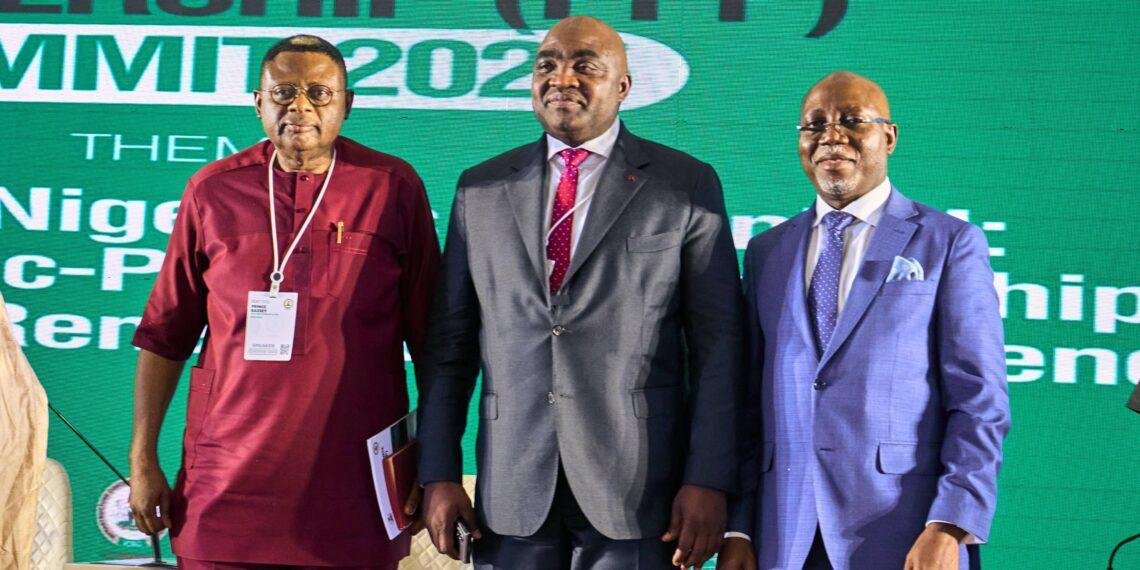Cross River State Governor, Bassey Otu and his Ondo State counterpart, Lucky Aiyedatiwa have underscored the potential of Public-Private Partnerships in driving growth and addressing development challenges.
According to them, Public-Private Partnerships offer a viable solution to bridging infrastructure gaps, enhancing service delivery, and stimulating economic growth, thereby improving the lives of citizens and fostering sustainable development.
They spoke as panelists at the 2025 Nigeria Public-Private Partnership Summit in Abuja.
The conference was convened by the Director General, Infrastructure Concession Regulatory Concession (ICRC), Jobson Ewalefoh with President Bola Tinubu as chief host.
The conference with the theme,: ‘Unlocking Nigeria’s potential: The role of Public-Private Partnerships in delivering the Renewed Hope Agenda,” brought together policymakers, investors, and industry leaders within and outside the country.
The two-day event featured five sessions with 42 speakers, attracted around 1,500 attendees with 15 partner organizations.
Titled: “Leveraging PPPs for infrastructure delivery in Nigeria: Opportunities and potentials,” the first session was moderated by Nnanna Anyim-Ude of the Nigerian Economic Summit Group (NESG).
In his intervention, Gov. Otu highlighted the vast potential of Public-Private Partnerships (PPPs) in addressing Nigeria’s infrastructure deficit.
According to him, PPPs can attract private sector investment, expertise, and efficiency to deliver critical infrastructure projects, drive economic growth, and improve the quality of life for Nigerians.
Speaking on the $3.5 billion Bakassi Deep Seaport, Gov. Otu highlighted the need for the project, citing increasing port congestion and Nigeria’s aspiration to become a trans-shipment hub for sub-Saharan Africa.
“The development of the Bakassi Deep Seaport is imperative to increase port capacity in the country and ease the pressure on existing ports.
“Most of the subnationals we have today are doing their very best to key into different sectors, taking their complementary advantage into consideration,” he stated.
On his part, Gov. Aiyedatiwa listed the immense benefits of PPPs to include infrastructure development, increased efficiency, job creation, economic growth and capacity building.
On the Ondo seaport, the governor said the $1.3 billion multipurpose project would transform the state’s economy, create thousands of jobs, and attract investments, while also serving as a catalyst for industrialization and economic growth in the region.
This, he stressed, would increase the state’s revenue base and improve the standard of living for its citizens.
“Our administration recognizes the potential of Public-Private Partnerships in driving growth and addressing development challenges, with a focus on enhancing public service delivery.
Read also:
- Nigeria to host landmark PPP summit 2025 to unlock infrastructure investment
- Ibas tasks Reps committee on monitoring PPP projects implementation
- MOWCA scribe Adalikwu canvasses PPPs to unlock benefits of inland waterways
“We remain committed to fostering and expanding these collaborations.
“For us, we’ve moved passed so many stages. We just need a few technical amendments between ICRC and the Ministry of Marine and Blue Economy.
“As I’m sitting here, I’ve letters of invitation to come to visit two of our investors who are keenly ready to move in as soon as that area is amended.
“We are ready. I believe our own deep sea port is a unique one. The modern vessels, the depth being required is about 16.5; we have a natural 18metre deep already without being dredged.
“But the beauty of it is that we still need more ports in Nigeria. In fact, every state even needs more than one port just like we have in Lagos with Apapa, Tin Can, Lekki Deep Sea Ports, yet we are having congestion.
“It’s not just about vessels bringing in products only. We have a lot of products we are to ship out of Nigeria. Don’t forget that Ondo State is a leading cocoa producing state in Nigeria,” the governor said.
The PPP summit, convened by the Infrastructure Concession Regulatory Commission (ICRC), is part of a broader effort by the Tinubu administration to bridge Nigeria’s estimated $2.3 trillion infrastructure deficit by leveraging private capital, technical expertise, and innovation to deliver inclusive and sustainable development across all sectors of the economy.






